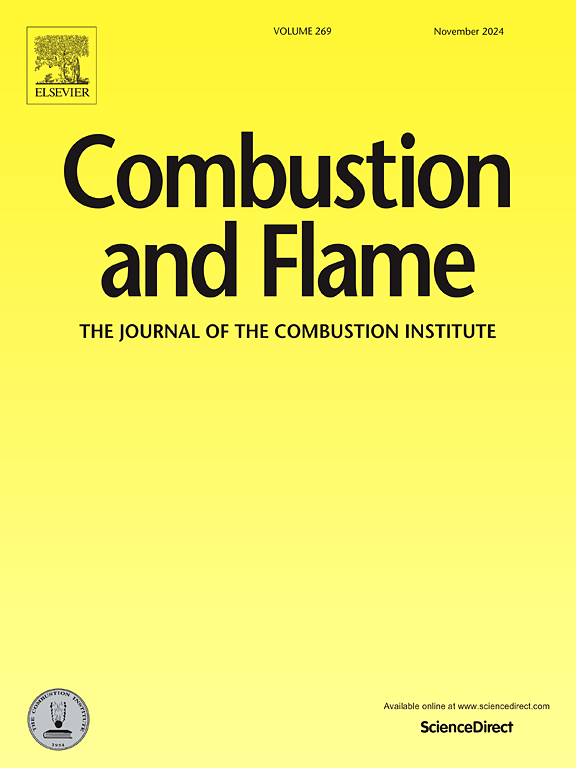ReaxFF molecular dynamics simulations of high-energy-density fuel combustion catalyzed by Pt-graphene hybrids
IF 6.2
2区 工程技术
Q2 ENERGY & FUELS
引用次数: 0
Abstract
The enhancement of combustion performance and ignition characteristics of high-energy-density fuels is crucial for the advancement of hypersonic propulsion systems. In particular, addressing long ignition delay times and incomplete fuel oxidation remains a key challenge. This study investigates the combustion reaction mechanisms of exo-tetrahydrodicyclopentadiene (exo-THDCPD) dispersed with Pt-graphene nanocatalysts using ReaxFF molecular dynamics simulations. Simulations were conducted at various temperatures to analyze the effects of Pt-graphene on fuel decomposition, ignition delay, and intermediate species formation. The results demonstrate that the presence of Pt-graphene significantly reduces ignition delay by accelerating radical formation and enhancing early-stage oxidation reactions. Additionally, the nanocatalyst promotes more complete combustion by facilitating CO oxidation to CO₂ and suppressing intermediate hydrocarbon accumulation. Reaction pathway analysis further confirms that Pt-graphene shifts fuel breakdown mechanisms toward oxidation-driven pathways, resulting in improved fuel consumption and combustion efficiency. These findings provide valuable insight into the role of nanocatalysts in optimizing fuel performance for high-speed propulsion applications.
pt -石墨烯杂化物催化高能量密度燃料燃烧的ReaxFF分子动力学模拟
提高高能量密度燃料的燃烧性能和点火特性对高超声速推进系统的发展至关重要。特别是,解决长点火延迟时间和燃料不完全氧化仍然是一个关键的挑战。本研究利用ReaxFF分子动力学模拟研究了分散在pt -石墨烯纳米催化剂上的外相四氢二环戊二烯(exo-THDCPD)的燃烧反应机理。在不同温度下进行了模拟,分析了pt -石墨烯对燃料分解、点火延迟和中间物质形成的影响。结果表明,pt -石墨烯的存在通过加速自由基形成和增强早期氧化反应显著减少了点火延迟。此外,纳米催化剂通过促进CO氧化为CO 2和抑制中间碳氢化合物聚集来促进更完全的燃烧。反应路径分析进一步证实,pt -石墨烯将燃料分解机制转变为氧化驱动的途径,从而提高了燃料消耗和燃烧效率。这些发现为纳米催化剂在优化高速推进应用中燃料性能方面的作用提供了有价值的见解。
本文章由计算机程序翻译,如有差异,请以英文原文为准。
求助全文
约1分钟内获得全文
求助全文
来源期刊

Combustion and Flame
工程技术-工程:化工
CiteScore
9.50
自引率
20.50%
发文量
631
审稿时长
3.8 months
期刊介绍:
The mission of the journal is to publish high quality work from experimental, theoretical, and computational investigations on the fundamentals of combustion phenomena and closely allied matters. While submissions in all pertinent areas are welcomed, past and recent focus of the journal has been on:
Development and validation of reaction kinetics, reduction of reaction mechanisms and modeling of combustion systems, including:
Conventional, alternative and surrogate fuels;
Pollutants;
Particulate and aerosol formation and abatement;
Heterogeneous processes.
Experimental, theoretical, and computational studies of laminar and turbulent combustion phenomena, including:
Premixed and non-premixed flames;
Ignition and extinction phenomena;
Flame propagation;
Flame structure;
Instabilities and swirl;
Flame spread;
Multi-phase reactants.
Advances in diagnostic and computational methods in combustion, including:
Measurement and simulation of scalar and vector properties;
Novel techniques;
State-of-the art applications.
Fundamental investigations of combustion technologies and systems, including:
Internal combustion engines;
Gas turbines;
Small- and large-scale stationary combustion and power generation;
Catalytic combustion;
Combustion synthesis;
Combustion under extreme conditions;
New concepts.
 求助内容:
求助内容: 应助结果提醒方式:
应助结果提醒方式:


